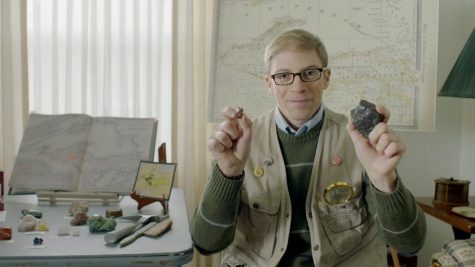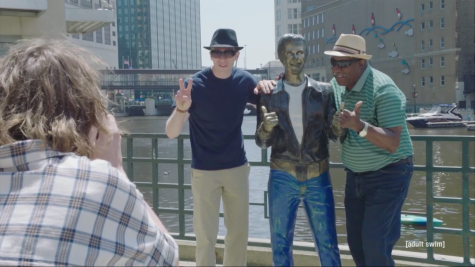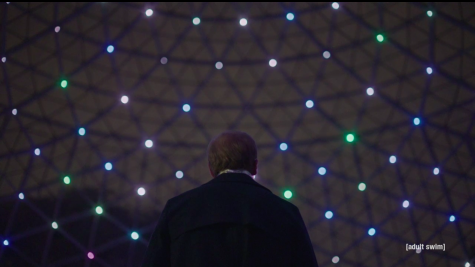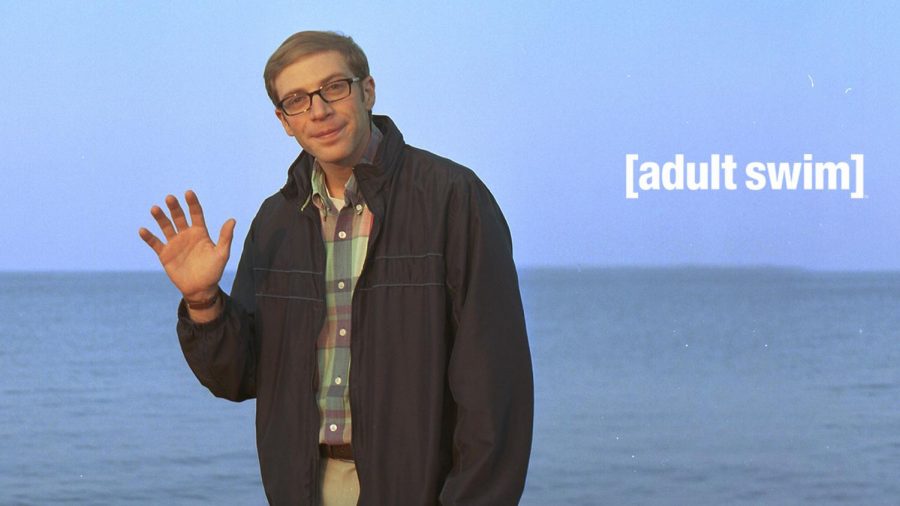Joe Pera talks with us about Milwaukee
Creator and star of Adult Swim’s “Joe Pera Talks with You” discusses his love for the city, the Mitchell Park Domes and more
Joe Pera waves to the audience in a promotional photo for his show. Set in Marquette, Michigan, the show shoots primarily in Milwaukee.
If you ask around at enough Milwaukee area coffee shops, fish frys and hair salons, you’ll most likely find at least one person who appears in Joe Pera Talks with You.
The Adult Swim TV series, which is shot primarily in the Milwaukee area, stars comedian Joe Pera playing a fictionalized version of himself: a soft-spoken middle school choir teacher living quietly in Marquette, Michigan. Pera guides viewers through his daily life, speaking to the audience in a calm, slow voice as he shops at the grocery store or takes a fall drive in his 2001 Buick Park Avenue.
Joe Pera Talks with You is unlike anything on TV at the moment, due to its relaxing pace and generally calming intentions. The series is different from many comedy shows: it would rather illuminate the joy in simplicity than the confusion in absurdity. For example, in the second episode, Pera opens the show by greeting viewers at his local diner –– or “family restaurant” –– and introduces the audience to his friends, neighbors and fellow patrons as he tries to figure out what he wants to eat for his Saturday morning breakfast. Of course, through all of these humdrum settings is dry, witty humor that keeps the show from being a completely serene experience.
But the show doesn’t live in complete bliss from the harsh realities of the world. Viewers are sometimes shot back into reality as Pera, for example, helps his neighbors, the Melskis, aid their marital conflict. And the show, towards the end of season one, sees the real world close in on its protective walls as Pera becomes overwhelmed with the many looming crises that the world faces. In this way, the show beautifully empathizes with the current state of the world, and still finds the ability to comfort the audience.
The show becomes even more endearing when you learn that it’s mostly filmed in the Milwaukee area. The diner in that breakfast episode is actually Copper Kitchen on Howell Ave, and the restaurant that Joe goes to with his nana for their weekly Friday fish fry is in reality Alioto’s in Wauwatosa.
Because a lot of the show is filmed in Milwaukee, most of the casting is done here, too. Pera, for example, found that the owner of the hair salon they were shooting in would fit perfectly into that scene. There are even Shorewood connections: Rose Callahan, freshman, appears in the show as Nicole, the oldest of the three Melski children. Callahan auditioned for the role in sixth grade and got the part, and is in several episodes throughout both seasons. Callahan feels that Milwaukee amplifies the aspects of the show that make it so unique.

“[Milwaukee’s] big enough that you have the space and the options to film, and then also there are parts of it that are perfect for a small town feel and the scenery the show gives us,” Callahan said. “I just think that Milwaukee contributes to the sense of community the show has.”
Callahan’s experience on set gave her a strong idea of who was behind the show.
“Joe Pera is one of the nicest people I’ve ever met, and everybody who I was acting with was amazing,” Callahan said. “All of the [people], the crew especially, they’re all super genuine people.”
Ripples spoke with Joe Pera to talk about how Milwaukee contributes to the show, his love of the city, the Mitchell Park Domes and more.
When I watch the show I really enjoy seeing Milwaukee used subtly as a backdrop. How did you decide to film a good portion of the show in Milwaukee?
It basically came down to it being driving distance to the Upper Peninsula, but also a little bit of a bigger city with the opportunity to … there’s more film crew that’s already established in Milwaukee, and we can use actors from Chicago more easily, and then it’s just a lot of the locations have a similar feel that we were able to find.
Did you always know you couldn’t film in Marquette?
No, the original intention was to shoot up there, and we do shoot up there a good bit, but we just realized when we started shooting that –– I had never done a television production of this size, so we did the first season, and the producer kind of talked us through about how difficult it would be to shoot the whole thing in Marquette. I always want to shoot more up there but if a camera malfunctions –– we need to get a lot of our gear out of Chicago –– if a camera malfunctioned and we were in the U.P. we would lose like a full day of shooting.
Speaking of the UP and making Milwaukee look like Marquette, I’ve always wondered why you think it’s important that Joe lives in Marquette, and why is that so essential to the show?
It started because it was very similar to my home town of Buffalo, but different enough and there’s a lot more nature up there. I think there’s other stuff that benefits the character being in the UP, but I mean a large part is just I love shooting in the nature up there, and writing a story for it, and visiting.
What were some general advantages that came with filming in Milwaukee?
Like I said, being able to use the great actors in Milwaukee and Chicago –– and there are some very good actors in Marquette, but [compared to] the cities, there’s not quite as many. And also the people on the show, a lot of them came from the Chicago improv scene, so they have a lot of connections and very funny friends out of there that we know that are … just an hour away, so that’s definitely a benefit. And the crew in Milwaukee that we use, a lot of people have been there for a number of seasons, and they’re so nice to work with. The crew in Milwaukee is one of the best aspects of the show, being able to use the same people season after season, it’s really wonderful to, you know, get to know people, and work with them and learn how they work and the familiarity of the crew is a huge benefit.
What were the disadvantages to filming here, if there were any?
Not as much snow, we’re always looking for more snow, and there’s a lot of snow in Milwaukee but still not quite the same, and Marquette gets at least two weeks to a month more of winter, so I always like shooting in the snow and it’s hard knowing that it disappears in Milwaukee just a little bit faster for our schedule. And there’s a lot more locations in Marquette that I’d love to feature and spend more time at but it’s just not possible when we’re shooting in Milwaukee. So we’ll do small things each year, but yea I guess that’s the downside. But the upside is I’ve learned just how much I love Milwaukee after spending so much time there the past few years. It’d be hard to imagine doing it another way because I just enjoy being in Milwaukee for three or four months during the year.
Did you ever visit Milwaukee growing up?
Oh yeah, I did. I have an aunt and uncle who live nearby so I had been, and they took us around. They live up in Cedarburg, so we went to the art gallery and we went to the Sprecher Factory. We did kind of touristy stuff but it was pleasant. That experience in Wisconsin was… I don’t know, I’ve always had a nice time there the couple times I had visited before.
I read in an interview you did with Milwaukee Record that you got really lucky because a lot of Milwaukee doesn’t look like the UP, but enough of it as a setting does so you were able to make it work. How much trial and error did it take to find a rhythm to filming here?
It’s always different each year because we’re shooting different scenes in different locations, so there are always problems that come up. I think it gets easier each time, because the more people you know … Like this year if we were looking for a location, you know, we just know more people in Milwaukee so we could send out an email or even ask the crew “do you or any of your family know a place that would be good to shoot?” I know it’s not how most TV shows work but it feels like we get more
specific locations and more local-feeling locations like the houses we shoot at and the restaurants we shoot at. They just feel more specific, because they often come through some connection we have established in the previous season.
I think that definitely contributes to the midwest feeling that the show has –– the mood is very gentle and polite –– and I’m sure that’s kind because of all of these real places that you’re shooting in. What about Milwaukee, other than the houses and restaurants you were filming in, helped you create that kind of specific [midwest] feeling you wanted to convey?
It’s all personal taste, so a lot of the places that we end up shooting at, like Allioto’s, it’s just places that I like that I actually visit when I’m staying there, and a lot of places I’ve eaten at or go to or get a beer at. And it’s just the types of places I actually like hanging out in are the places we end up shooting at. So I guess in that way … I think living there and being able to spend time there allows me to explore the city and kind of find the things that I want to put in the show naturally.
What is your relationship with that kind of midwest sensibility that the show has? Is it something you grew up with? Or are you kind of familiar with it so it’s easy to portray that?
Yea, a lot of the grandmother characters are based on my relationship with my real grandparents. Like the breakfast episode in the first season, it’s a lot of things that I used to do with my family growing up, and the types of places that I used to visit, and they’re very –– I didn’t realize it at the time –– but they’re very specific and particular to Buffalo, where I grew up. And I think it carries to other parts of –– Buffalo is more rust belt than midwest –– but I feel that it kind of carries over, and I’m realizing that those very specific things that I used to do aren’t as universal as I thought when I was doing them as a 10 year old. So trying to capture them and the feelings that I had doing those things is what people like to see in a TV show.

I’m kind of curious about the thought behind the episode “Joe Pera Teaches You How to do Good Fashion” [an episode in which Pera leaves Marquette and visits Milwaukee for a few days]. Why did you decide to have an episode explicitly set in Milwaukee?
The idea started because we wanted to use Milwaukee as itself, and show off some of the things we like about the city without, you know, pretending it’s someplace else, so it just made sense to have them go to Milwaukee, the place where we actually shoot most of the stuff, to show off some of the sights and Milwaukee flavor. And also for the characters coming from the U.P., Milwaukee is a much larger city, and it’s fun to show them in that type of environment.
Yeah, for me it was pretty amusing to see this city I was pretty familiar with kind of glorified in a way that I hadn’t really seen before.
[Laughs] I mean, like the Mitchell Park Domes, I had been wanting to shoot there since we started to visit –– the fact that we were able to was the dream. I mean, they’re something to experience, and, I don’t know … you drive by stuff in your own town everyday without thinking about it, but, you know, giant light-up botanical gardens in glass domes –– it’s pretty incredible. Sometimes when we shoot in a place you get to think about those “what is special about it?” It wasn’t quite the most realistic portrayal of Milwaukee to some degree but as a tourist you often see the better parts and to see things with fresh eyes and have a more positive view of a place when you visit for a few days. So that’s what we tried to do in that episode.
I also think the episode has pretty big plot significance, so you came up with the idea to feature Milwaukee because you wanted to feature it, and then kind of developed the episode as a getaway for Joe?
Yea, I don’t know, it’s a good thing in a show in terms of, if you want a character to grow you put him in a new environment, and oftentimes putting a character in a new environment will allow … you know, going anywhere in person allows you to see things with fresh eyes and get a different perspective than their regular day to day, and that is what we wanted for the character and I think it helped him sort some things out, same with the Gene character. Yeah, having to reconsider things is always good, and going to a different place helps you do that.
I notice you like to talk about breakfast a lot with your character, like the breakfast episode and [the Pancake Breakfast Critic series]. Do you have a favorite breakfast spot that you enjoy here?
Yes, Uncle Wolfie’s always has a great breakfast.
What’s your favorite thing to get there?
I usually just like an eggs, bacon, toast. You know, straight forward, or get an omelette. I usually keep it simple and not [get anything] sweet because I don’t want to get a big sugar rush and crash. But I’m trying to think, I think that’s one of the best breakfasts I had in Milwaukee. But also I’ll eat a lot of those Colectivo breakfast wraps while we’re shooting cause they’re easy to pick up in the morning, I eat a lot of those.
Yeah, those are good.
Yea, there’s one … it was pretty cold when we got there and I ended up just walking down the block from where we were staying, getting that and a coffee as a way to just leave the apartment, cause it was so cold and it was my motivation to get out.
When you come back to Milwaukee, is there [a favorite thing] you do right away?
I love to get fish frys. There was one afternoon, the weather was fine out and we couldn’t eat in a restaurant, but we got fish frys and, when it finally got nice, ate them on a blanket in the park, and that was a really nice afternoon. I like walking by the river and the lake, I spent a lot of time doing that. My Saturday mornings usually consist of going for a two hour walk down to South Shore Park, and then up the trail, so that’s a nice way to kind of settle my mind and I look forward to those walks a lot.
I loved the church announcements episode, and I think you captured in a really great way that childhood feeling of hearing a song for the first time and becoming obsessed with it. I was wondering if you remember a song from your childhood or adolescence that gave you the same feeling?
I mean, that one [Baba O’Riley] for sure. All sorts of stuff [laughs]. You know, just stuff that would come on the radio and you hear for the first time –– like a certain Beatles song –– and you’re so amazed as a ten year old, and you’ve never heard that before, and then your dad kind of rolls his eyes because it’s been on the radio a thousand times and he can’t hear again.

If I’m not mistaken, last Thursday, the 20th, was the show’s third anniversary, at least of being out in the world. Did you celebrate in any way?
[Laughs] I actually didn’t realize, but that is cool to know. It’s when it premiered?
Yes
Wow, yea no I didn’t realize. Yea, that’s really cool to know. I try not to, I don’t know, I’m not big on, you know, birthdays and events like that, and I kinda try and stay focused on making new stuff when I can, as opposed to that. But now that you bring it up that is pretty cool.
Looking back on the last three years, what can you say about the show’s reception and how it’s moved so many viewers?
I’m very happy. I’m glad that so many people have taken to it, and it’s nice to hear that people, during the pandemic, that they enjoyed watching it or it helped them relax, so knowing that people are still finding the show, three years later, is a nice thing, and I kind of like that people can stumble across it, and it’s out there. And I feel a sense of relief that I was able to make the seasons that I’ve been able to, cause it feels like I kind of wanted to get some of those ideas out there, and I’m glad that they’re now out there … I definitely felt more relaxed personally and creatively knowing that, at least, there’s two good seasons out, I think, I know people are enjoying them. Yeah, it’s really nice to hear.
Do you have anything else you’d like to add about Milwaukee or anything else?
No, just that I hope I get back to visit or do some shows sometime soon. I got to take a boat ride up the Milwaukee River a few months ago, and that was incredible, I had never done that before, it’s like a whole new look at the city. And also I can’t believe that they let –– I’m not going to say where we rented the boat from –– they were just like “one of you has driven a boat before?” And we said “yeah,” and it was nice. I think people should be able to drive boats through cities more often, I think it’s a good thing.
That’s good, I agree.

